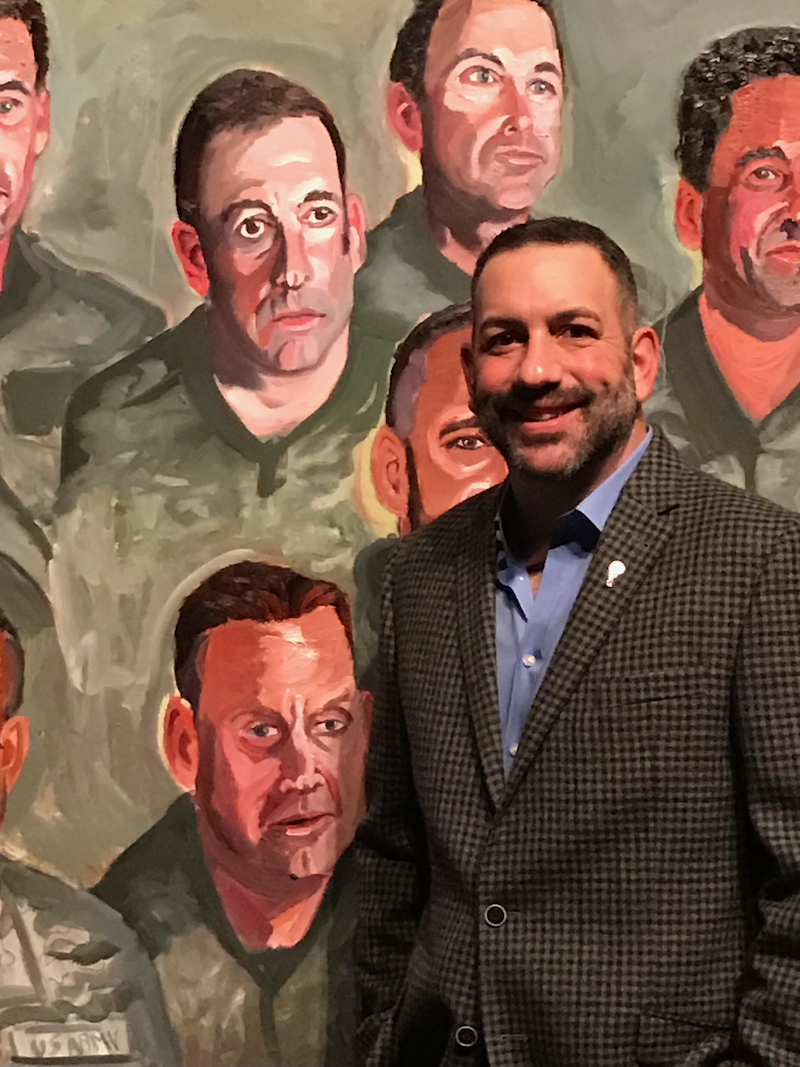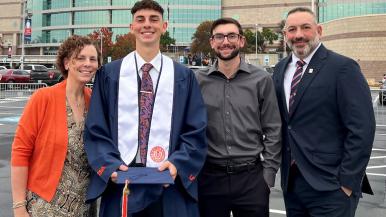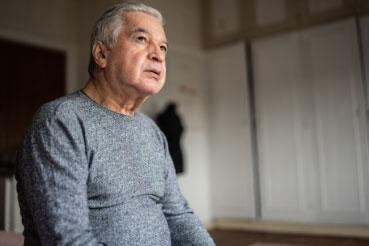Despite an incessant urge to turn back, Rob Ferrara pushed on.
Overcoming hesitation as he drove through city after city, the retired U.S. Army first sergeant ultimately made the long trip from San Antonio, Texas, to the Road Home Program at Rush University Medical Center in 2018.
“I didn’t want to go, because I was scared. I didn’t think I could do it,” said Rob, who until that time had viewed himself as a person who cared for others, not someone who needed help.
He’d tried therapy before, mostly to appease his wife, Melissa. But he wasn’t ready — until he met the staff at the Road Home Program.
“When I came to the program, I was trying to push my wife away with hopes of her leaving me,” he said. “But the harder I pushed, the harder she fought for us.”
During three weeks in the Road Home Program’s accelerated brain health program, Rob found the courage to look inward. He realized how much he had distanced himself from the people he loved most after returning from Iraq 11 years earlier.
“It was tough, because I had to open up and identify I did have — I don’t want to say a problem. I think I denied it for a long time,” Rob said. “The program finally opened my eyes.”
Rob said it’s clear to him now that he was struggling with post-traumatic stress disorder, or PTSD, and survivor’s guilt. His therapist at the Road Home Program helped him work through painful emotions about leaving his platoon after being injured in a roadside bomb explosion. Three men were killed in the blast.
“I still mourn the loss of those guys,” Rob said. “I still feel bad, but I’m at a point now where I realize it wasn’t my fault.”
When it became clear he needed shoulder surgery after the explosion, Rob was flown from Iraq to a U.S. Air Force base in Germany and finally Fort Carson, Colorado.
“I felt I let my platoon down. I didn’t want to be back home; I wanted to be with my platoon,” he said. “Looking back, it was just stupid. I didn’t realize how my thoughts impacted my family.”
A life of service
From a young age, Rob dreamed of serving in the Army. He wanted to be like his uncle, who served in the Army and Army Reserve. His father, who served in the Reserve in the 1950s and ’60s, and mother signed for Rob in 1989, when he was 17 years old.
He was stationed in North Carolina in 1993 when he met Melissa during a trip home to Rhode Island. They married in 1996 and settled in Rhode Island after Rob was assigned to recruiting duty.
The Ferraras’ sons were ages 8 and 5 when Rob learned he was being deployed to Iraq. Melissa immediately realized how tough his deployment would be for their family, but Rob didn’t think much about it until the night he had to leave, he said.
“That was probably one of the hardest things I’ve ever had to do,” he said. “My whole career, I was always like, ‘I’m in the infantry, and I need to deploy.’ You train for it all of your career. You want to go, you want to do it, but you don’t think about the other half of it.”
His platoon was sent to the Sadr City area of Baghdad and the Diyala Province. After he was injured in the explosion, he was unable to return to the infantry until he recovered from his injuries. The Army sent Rob back to Rhode Island, where he worked as an ROTC instructor, and later to Fort Bliss in El Paso, Texas, for two years. He retired from the Army in 2012.
A few years later, Rob was working for Wounded Warrior Project® when he snapped at the organization’s chief financial officer during a dinner. The executive suggested he might benefit from the Road Home Program, but Rob denied he needed help, he said.

The first time Rob saw the darkness in himself was in a portrait painted by former President George W. Bush.
Rob met Bush in 2013, after he applied and was invited to participate in the annual Warrior 100K Ride at Bush’s ranch in Crawford, Texas. Rob and his wife have participated in several rides since then. Bush painted veterans who participated in the ride, Rob said.
“My eyes were black,” Rob said of the portrait. “That was the first time I realized I was there, but not really. I didn’t have love for anyone. That painting really showed me the person I was.”
A man transformed
Rob’s shoulder still bothers him, but his unseen symptoms caused him the most pain.
“He was just a totally different person pre-deployment to post-deployment,” Melissa said. “He left one person and came back as someone we didn’t really know.”
Rob had become angry, guarded and “not very pleasant, to be honest,” she said. Before joining her husband during his third week at the Road Home Program, Melissa noticed little changes in Rob during phone conversations.
“When I got to Chicago, I could tell just by looking at him,” she said. “It was like he had finally taken a deep breath. He was more like the person I knew before his deployment.”
Rob said it felt like a weight had been lifted off him. As he and his wife drove home to San Antonio, more of his old personality came out and they enjoyed the time together, Melissa said. The Road Home Program transformed Rob, allowing him to move from a life of apathy to one filled with love for his wife and two sons, Robert, now 25, and Evan, now 22.
Back at home, Rob began spending more one-on-one time with Evan. A conversation they had while watching the movie “Lone Survivor” made Rob realize how mature his son had become — and how much he had missed as Evan grew up. Evan graduated from the University of Texas at San Antonio in 2023.
Rob’s older son, Robert, recently returned home after serving four years in the Air Force and is in his second year of college. They, too, have forged a closer relationship.
“Seeing them grow and the work my wife put into raising them while I was gone, it’s amazing how successful they are today,” he said.
Rob still experiences times when he feels down, but instead of every day, it’s once or twice a month, he said.
“I love my life right now. I think this is the best our marriage has ever been,” he said. “We will celebrate 28 years in September. My wife is truly my best friend and my soulmate. I know for a bunch of years, I didn’t make her feel loved. I didn’t make her feel special. But I love my life now. I love her. I love our boys. It’s a treat.”
A gift to the Road Home Program is an investment in a better future, not only for veterans but for generations after them, he said.




